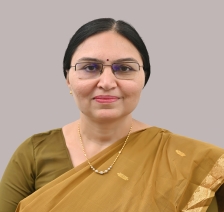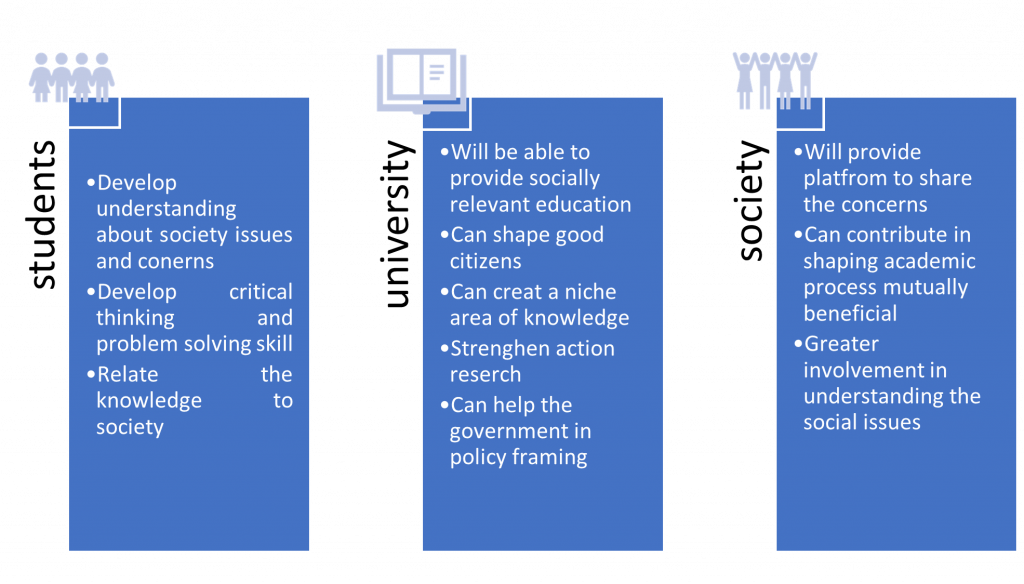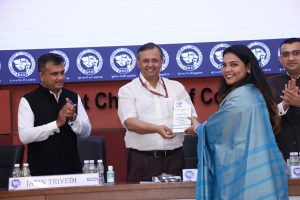Article by Faculty
Integration of Community Engagement in University Education

Dr Madhuri Parikh
Director and Dean (I/c)
Institute of Law
Social transformation is closely linked with education. The institutions of higher education can play pivotal role in social transformation and entrenching values of democratic participation and social justice. The Extension activities and Community Engagement pedagogy in higher education institutions are effective methods to achieve this goal.
There is a global trend to incorporate community engagement in university education. Recently University Grant Commission [UGC] has declared a draft notification on Fostering Social Responsibility & Community Engagement in Institutions of Higher Educations in India 2.0 published in January, 2022. The concept of Community engagement is also emphasised in the National Education Policy of 2022. This concept has twin objective of achieving quality education and contributing in economic and social development of a nation.
The Concept of Community Engagement [CE]
The Carnegie Foundation for the Advancement of Teaching Community Engagement describes Community engagement as the collaboration between higher education institutions and their large communities (local, regional/state, national, global) for the mutually beneficial exchange of knowledge and resources in a context of partnership and reciprocity.
Community engagement expects continuous dialogue and integration of it in teaching, learning and research processes. Outreach activities may be many times one way process whereas community engagement is an ongoing and reciprocal process. It means not only society is benefited from CE but at the same time academia is also benefited by enriching and integrating observations from the real world. It is beneficial to the students, faculties and to the universities as it promotes inclusivity and partnership in knowledge development provided if universities implement it with the aim to work with the communities and not for the communities.
Advantages of Integration of CE
There are three pronged advantages of inclusion of CE in higher education institutes as described in the diagram below:

Institutionalisation of CE: Prospects and Challenges
There are numerous ways to integrate community engagement in academic process depending on the programme learning goals. CE can be incorporated through internships, social project-based learning in courses, through research, through National Service Scheme programmes and other such co-curricular activities. Since pre-Independence steps have been taken to integrate CE in University education in India, like Zakir Hussain Committee’s Report, Dr Radha Krishna Commission’s report, Report of the Subcommittee on Community Engagement in 2015, and a recent draft notification on Fostering Social Responsibility & Community Engagement in Institutions of Higher Educations in India 2.0 published in 2022 which emphasised on community engagement in Institutes of Higher Education. Integration of CE in education is need of the day as it is directly linked with Goal 4 of India’s commitment to implementation of Sustainable Development Goals (SDGs). Institutionalisation of CE in University education is ideal but its effective implementation needs proper planning and resources.
An effective integration of CE with teaching learning and research processes is challenging task for the institutes of higher education. It will be really difficult for the Universities or Institutions with huge strength of students to include CE as part of the academic process. The problem will arise at multiple level. For instance, to get involvement of each student into CE activity. Planning, Execution, and Review are the three essential aspects for better implementation of CE which might be a challenging task when the number of students is more. Moreover, the teachers should be trained to carry out CE with proper understanding of its objective.
The next challenge may be requirement of resources to carry out CE integrated with academic activities. It is not merely customary one or two visits to the field of study but an ongoing process. For taking students to this assigned field study, the university and institutions need to invest in human resources which have financial implications for the institutions.
The real challenge is the selection of location or field to carry out CE. It means which community to be engaged for the study? The nature of community engagement, objectives of CE and objectives of the course should be the guiding force for identifying community to be engaged.
The draft notification has proposed detailed guidelines for its implementation in Higher Education curriculum. The Universities are gearing up for this new concept. It is a time for the teachers and students to adopt this vision and to get ready for the change. The true implementation of this integration will really manifest the vision of achieving Social Justice as enshrined in the Indian Constitution.
Awards and Achievements
 Dr Mayur Patel, Associate Professor, Department of Pharmaceutics and Dr Snehal Patel, Associate Professor, Department of Pharmacology, Institute of Pharmacy have been recognised as one of the World’s Top 2% scientists for the year 2021 published by Stanford University in its Oct 2022 report.
Dr Mayur Patel, Associate Professor, Department of Pharmaceutics and Dr Snehal Patel, Associate Professor, Department of Pharmacology, Institute of Pharmacy have been recognised as one of the World’s Top 2% scientists for the year 2021 published by Stanford University in its Oct 2022 report.

WAAH Science Laureate Awards


Faculty members and PhD students of the Mechanical and Chemical Engineering department, Institute of Technology, received “We All Are Human (WAAH)” Science Laureate Awards (Senior Laureate category) on Jan 11, 2023. The Vikram A Sarabhai Community Science Centre, Ahmedabad conferred the awards. Kinnary Modi, PhD student along with Assistant Professors Dr Shebaz Memon and Dr Darshit S Upadhyay received the first runners-up award for their study on ‘Environment Friendly and Energy Improved Biomass Cookstove for Better Human Health’. Dr Niraj Shah, Associate Professor, Institute of Technology mentored the trio. Sidhartha Sondh and Kangana Bhatt, PhD students along with Dr Darshit Upadhyay received the second runners-up award for their work on ‘Solid Waste Treatment: A Potential for Future Fuel’. Dr Sanjay Patel, Professor, Institute of Technology mentored the trio.